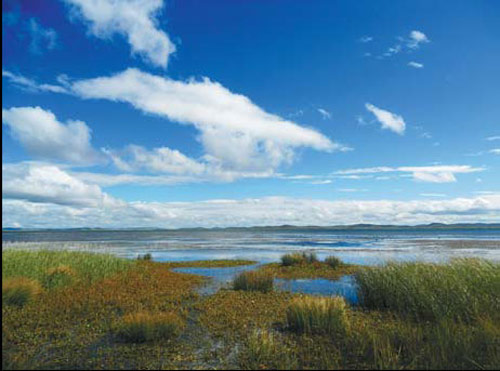A view of the 'immortal world'
 |
|
The Flower Lake is famous for its azure sky and varieties of flora and fauna. Huang Zhiling / China Daily |
Frustrated with the maddening crowd in Chengdu, capital of Sichuan province, my desire to get closer to nature reached its limit.
I've long heard of the irresistible appeal of the Flower Lake, a marvelous scenic spot known for its blue sky, crystal-clear water and dazzling varieties of flora and fauna.
Despite my busy schedule, I managed to squeeze in a few days last month to visit the lake, located more than 3,000 meters above sea level in Zoige county on the eastern edge of the Qinghai-Tibet Plateau.
At the start of the trip, my guide Yi Feng says Flower Lake got its name because of the variety of flowers, which blossom in and by the lake in late June and early July.
"Visiting the Flower Lake is like going from the mortal world to the immortal world," says the 48-year-old Tibetan, who dons a leather hat.
Tents, yaks and sheep dot the endless grassland on the way to the lake. Driving takes skills because one has to be on constant lookout for yaks and sheep crossing the road.
Yaks are the staple source of meat in the Tibetan-inhabited area. An adult yak is worth as much as 5,000 yuan ($801), says Chen Shunqing, an information officer of the Qiang nationality with the Aba Tibetan and Qiang autonomous prefecture government.
With its altitude ranging from 3,000 to 4,000 meters, Aba abounds in mountain springs and Chinese caterpillar fungus. "Locals in Aba believe yaks grow up by eating the Chinese caterpillar fungus and drinking mineral water," he reveals.
Sacred symbols of Tibetan Buddhism could be found from time to time. What is most ubiquitous are prayer flags - long strips of printed cloth hoisted on poles - wafting mantras to heaven. The passage of time has turned some of them into tattered rags.
Approaching the Flower Lake, I find the air refreshing and the sky incredibly azure. What is most imposing is the cluster of white clouds. As there are no buildings around the lake, the clouds look so big and near that they seem to embrace the lake.
Despite altitude sickness, many visitors rush to the lake to take photos of the white clouds in the sky. "I have never seen such big, white clouds before," says a young visitor from Beijing.
Although it is a pity that I did not visit Flower Lake during the summer when the flowers are in full bloom, the beauty during autumn is unparallel.
Walking leisurely on a plank road leading to the lake, the tranquility of the surroundings envelops me, and the only sound that I hear is the chirping of birds.
Covering 213,333 hectares, the Flower Lake, which is also a wetland, is home to the yellow duck, black-necked crane, gull, marmot, hare and plateau fish. The yellow duck, black-necked crane and plateau fish are rare animals on the plateau wetland.
What I find particularly fascinating is the crystal-clear water in the lake filled with all kinds of water plants which emits fresh fragrance into the air.
The number of visitors to Zoige has risen from 400,000 to 1 million in recent years because of the strong appeal of its grassland and the rising popularity of the formerly obscure Flower Lake, according to Wang Zha, deputy Party chief of the county.
"The influx of tourists has increased the income of herdsmen in fixed residences, as Zoige does not have many hotels. During the busy travel season in summer, many visitors have to live in cars as all the hotel rooms in the small county of 65,900 people are booked up, " he says.
huangzhiling@chinadaily.com.cn














